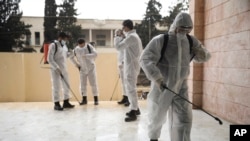The lives of Syrian refugees across the Middle East have become increasingly difficult as families are forced to address the potential spread of coronavirus to overcrowded camps in Lebanon, Jordan, Idlib and Turkey.
Abou Mohammed, who lives in a tent camp in the rebel-controlled northern Syrian enclave of Idlib, told Arab media that he is dealing with the coronavirus crisis by using cotton swabs and rubbing alcohol to disinfect his children's hands and faces. He said it's impossible to stay isolated given conditions of the camp.
Rami Abdel Rahman of the Britain-based Syrian Observatory for Human Rights told Saudi-owned al-Arabiya TV that the Idlib region is "teeming with refugees and has only one hospital bed per 1,600 people, just 200 emergency room slots and only 95 ventilators" if the coronavirus were to spread.
In Jordan's Zaatar refugee camp for Syrian refugees, Mohanned Abou Siam told al-Hurra TV that the camp has about 76,000 students and children, and that health workers were doing their best to teach them how to sterilize their hands and faces to avoid getting coronavirus.
Ali, a resident of the Katermeya refugee camp in Lebanon, told Arab media that "no one is allowed to enter or leave the camp to prevent the spread of the virus and that everyone is being made to stay inside his own tent or enclosure.
Fouad Issa, who works for a nongovernmental organization that cares for Syrian refugees along the Turkish border, said it is "currently impossible to tell how widespread the virus may be in the north of Syria, because there is no real way to test people for it, given the current conditions."
One Syrian refugee, however, pointed out that he "does not know anyone in his camp [near Idlib] who has the virus, so far." Another Syrian refugee in Lebanon made the same observation.
Khattar Abou Diab, who teaches at the University of Paris, told VOA that "anecdotal evidence for the time being seems to indicate that there isn't a serious epidemic of coronavirus among Syrian refugees in the north of the country, but that the situation could become dramatic if the virus did start to spread, given the primitive health facilities in the area."
Turkish media showed an exodus of Syrian refugees who had been camped along the border with Greece being taken by bus back to Istanbul amid fears that coronavirus could spread because of unsanitary conditions where they were living.





